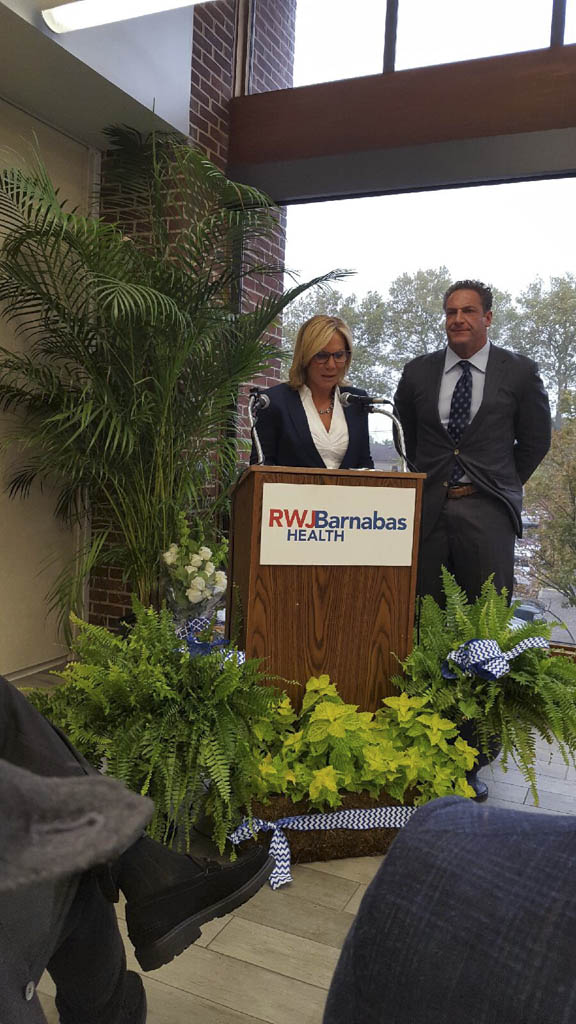By KENNY WALTER
Staff Writer
LONG BRANCH — A donation from a local family who lost a son to an accidental drug overdose has led to the dedication of the new Tigger Opioid Overdose Recovery Consultation Room in the Monmouth Medical Center Emergency Department.
Rick and Lisa Stavola founded the Tigger House Foundation to help other families deal with opioid abuse after their son, Ricky “Tigger” Stavola Jr., died of an overdose in 2013.
“We decided to honor Tigger and take a resolute stand to fight the raging opioid heroin epidemic,” Lisa Stavola said. “Tigger had a heart of gold and as a child he always reached out to help others close to him.
“It is fitting that we honor him by extending a hand to others in the same way.”
The consultation room was funded with a $1 million donation from the Tigger House Foundation. Bill Arnold, president and CEO of Monmouth Medical Center, said fighting the heroin problem is crucial, especially in New Jersey.
“When you look at the statistics, right now it is 10 times greater an issue than AIDS was at its peak,” he said. “The monies that were given –thank you so much.
“With this gift we have a nice room where the specialist can bring family members to a quiet location and they can get the resources they need, they can get the information they need to get to that next place.”
Arnold said there is still a stigma attached to opioid abuse.
“This is no different from any other disease out there,” he said. “We need to be sure to transition the patients that are going through this disease to that next level of care.
“The challenge is overwhelming. The experience that both Lisa and Rick gave to me really motivated me to work here, whether it be working with our system officials at the state level fighting for more dollars and recognition of this disease.”
Victor Almeida, chairman of emergency medicine for Monmouth Medical Center, said the heroin problem has increased dramatically in the last five years.
“The emergency department is the microcosm of the problems that are occurring in the country today,” he said. “We see it every day.
“The state as a whole really has triple the rate of death from opioids compared to the rest of the country.”
According to Almeida, there was a 200 percent increase in opioid-related deaths in Monmouth and Ocean counties between 2011 and 2014.
However, he said a push to have recovery specialists speak to anyone getting treated for an overdose has helped reduce the number of deaths.
“The recovery coach comes in, speaks to the patients and because it is peer-to-peer, someone who has walked the walk, it actually resonates with the patient,” he said.
Almeida said in the first six months of using a recovery coach, 36 percent of patients sought outside help to treat the addiction problems. He said in the prior two years, only one out of 117 patients went on to immediately seek outside help.
Vice President of Development for the Monmouth Medical Center Foundation Tara Kelly, who also read letters from Gov. Chris Christie and Lt. Gov. Kim Guadagno about the program, said the room will have a big impact on those suffering from substance abuse problems.
“After meeting the Stavolas and being allowed to work on this project with them, it really is incredible to see something come to fruition with such great magnitude and a great need,” Kelly said.
Also part of the Tigger House Foundation was Christian Peter, the former New York Giants defensive tackle who has battled substance abuse throughout his life but has since been sober.
Peter said the Tigger House was Stavola’s lasting impact.
“He was going to do something big, but the disease of addiction can sometimes become overwhelming — it can plague the very core of the person, leaving them empty, a shell of what they once were,” Peter said. “In Tigger’s case the disease became bigger and stronger, it was more than he could handle, but that’s not to say Tigger didn’t put up a fight.
“With the formation of the Tigger House Foundation it gave hope to addicts and families that there is light at the end of the tunnel.”
For more information on the Tigger House Foundation, visit http://tiggerhouse.org.

